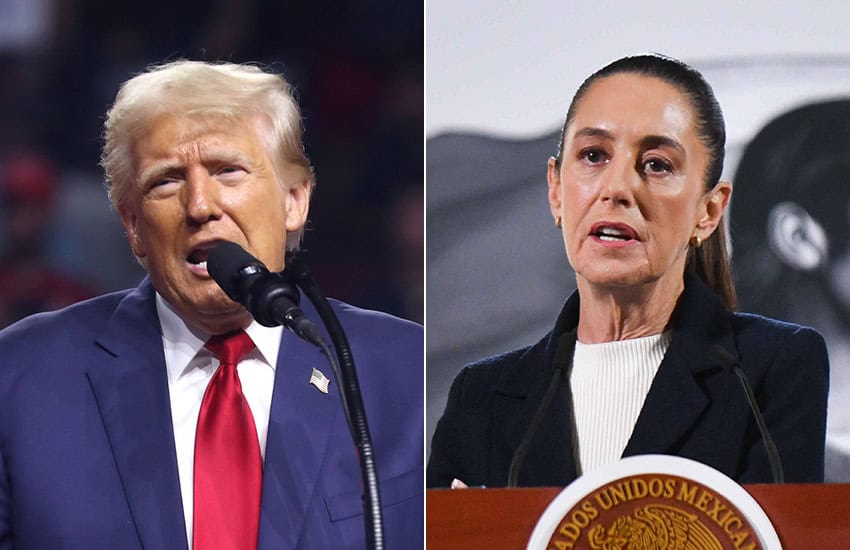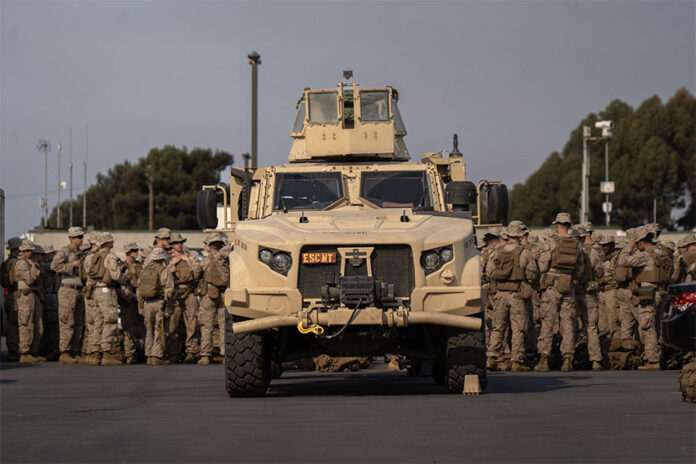After the U.S. government announced on Wednesday that it intended “to pursue total elimination of Cartels and Transnational Criminal Organizations,” Mexican President Claudia Sheinbaum encouraged Washington to first address U.S. domestic issues related to drug trafficking.
On Feb. 5, the U.S. Attorney General’s Office published a memo for all Department of Justice (DOJ) employees announcing that President Donald Trump had issued a directive urging the federal government “to revise existing national security and counter-narcotics strategies.”
Sheinbaum responded during her Friday morning news conference, saying “They should start with their own country; of course, we are going to coordinate and collaborate, as I said on Thursday — never subordination or interference; it is coordination.”
The memorandum stated that the DOJ “must harness [its] resources … and empower federal prosecutors throughout the country to work urgently with the Department of Homeland Security and other parts of the government toward the goal of eliminating these threats to U.S. sovereignty.”
Ioan Grillo, a Mexico-based journalist who focuses on crime and drugs, lauded the notion of hitting cartels hard in a social media post, but expressed wariness about the absolutist language.
“Total elimination of cartels sounds like an impossible task,” he wrote, explaining that “campaigns to totally eliminate drugs … or terrorism often fall short.”
The US Attorney General’s office issues memorandum calling for the “total elimination of cartels and transnational criminal organizations.”
I agree with hitting cartels hard, but I’m wary of such absolutist language. “Total elimination of cartels” sounds like an impossible task. pic.twitter.com/u5Y9rFTquZ
— Ioan Grillo (@ioangrillo) February 6, 2025
The Trump administration memo also set forth mandates and initiatives, including charging priorities, removing bureaucratic impediments to aggressive prosecutions, and enhancing enforcement efforts against human smuggling and trafficking groups by empowering existing joint task forces.
In addition, the Drug Enforcement Administration (DEA), the Office of Legal Policy and the Office of Legislative Affairs were directed to advocate legislative reforms to improve counter-narcotics efforts.
On his first day in office, Trump signed an executive order to designate drug cartels as foreign terrorist organizations, while criticizing the Mexican government’s alleged ties to drug cartels. He also declared a national emergency at the U.S.-Mexico border, allowing the U.S. Department of Defense to deploy armed forces to the region.
Sheinbaum has objected to Trump’s characterization of Mexico as a narco-state, and on Friday, she said the U.S. must share responsibility.

“They have a lot to do in the United States; how does fentanyl or any other drug … get there? Who brings it across the border?,” she asked. “Who operates the distribution of the drug? Who sells the drugs in the U.S. cities that have caused so much tragedy?”
But U.S. authorities appear more focused on Mexico.
Acting Director of U.S. Immigration and Customs Enforcement (ICE) Tom Homan said on Thursday that President Trump won’t hesitate to use the U.S. military against Mexican cartels, if necessary.
Speaking in the context of the increased U.S. military presence at the Mexican border, the U.S. border czar said troops “need to protect themselves,” insisting that Trump would send a warning to the cartels if any U.S. soldiers are harmed.
“I think the cartels would be foolish to take on the military, but we know they’ve taken on the Mexican military before,” he told ABC News Live. “But now we have the United States military.”
In an interview with MVS Noticias, Grillo dismissed rumors that cartels are planning to attack the U.S. military and warned that the aggressive stance being taken by the U.S. could result in a diplomatic crisis, or worse, a large-scale conflict.
“They could go in and kill 30 or 40 cartel operatives, but this won’t make much difference when there are 180,000 people working for the cartels,” he said.
The bigger concern, he said, is the chance that civilians could be caught in the crossfire.
With reports from ABC News, Anadolu Agency, El País and MVS Noticias
